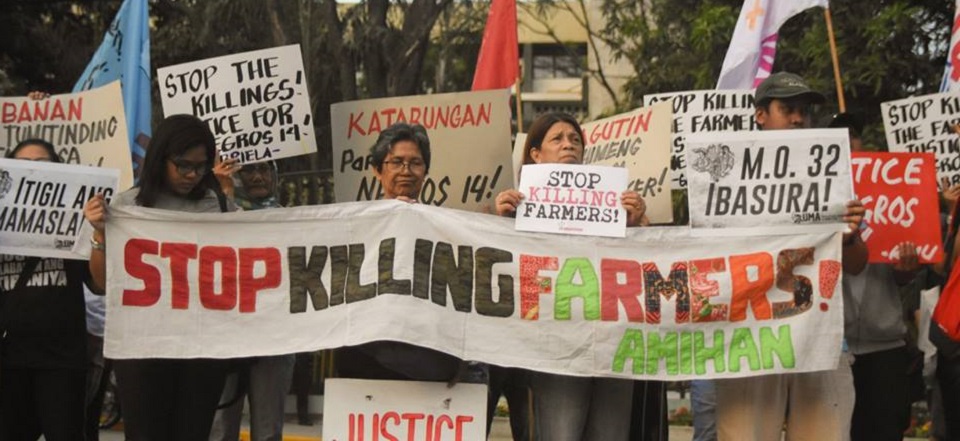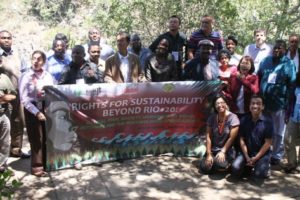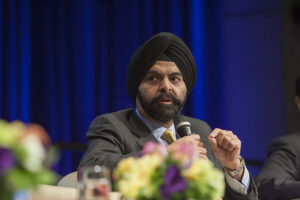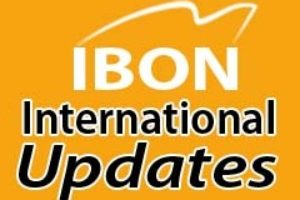Photo: Loi Manalansan
On March 30, 2019, fourteen peasants were killed in different parts of Negros Oriental province in the Philippines – including Edgardo Avelino, chairperson of Hugpong-Kusog Mag-uuma sa Canlaon (HUKOM), which is a local farmers’ organisation affiliated with the Kilusang Magbubukid ng Pilipinas (KMP, Peasant Movement of the Philippines). Twelve other people were arrested on the same day, including Nestor Kadusale, a peasant leader of KMP-Negros; Corazon Javier, Gabriela Coordinator; and Azucena Garubat, Anakpawis Coordinator.
Local human rights organizations relate the killings to the increasing militarization of Negros communities by the Philippine Army, augmented by the police campaign Synchronized Enhanced Managing of Police Operations (SEMPO, also known as Oplan Sauron) and Philippine President Duterte’s Memorandum Order No. 32, s. 2018 which placed Negros and two other regions in a state of emergency.
The memorandum was signed in light of the Sagay massacre in October 2018 — only five months prior the current incident — wherein nine peasants were killed and three others were wounded during a bungkalan (cultivation of idle lands) activity in the neighbouring province of Negros Occidental.
In April 2019, Datu Kaylo, a chieftain of the Manobo tribe and a land rights defender, was also killed by military operations in southern Philippines, an island under military rule. To date, a total of 205 farmers have been extrajudicially killed under Duterte’s regime.
Aside from these, the first quarter of 2019 was also marked by cases of killings and other attacks against farmers, land rights activists and peasants elsewhere in the global South. Amidst concerns with continuing activist killings in Colombia, Dilio Corpus Guetio, a member of a peasant organisation, was killed in late January as he was leaving his house in Cauca, southwest of the country. In Palestine, the farmer Hamdi al-Naasan was killed by settlers supported by Israeli soldiers in late January at the northeast of Ramallah. He was part of struggles against the forced eviction of Palestinian peasants from their lands in their village.
In Cambodia, land rights defenders in the Prame and the Yeang communes, and members of the organisation Ponlok Khmer in Preah Vihear province, have borne the brunt of repressive measures from different trumped-up cases filed by land-grabbing corporations. In Brazil, landless rural workers face the right-wing government’s threat to classify land occupation campaigns as “akin to terrorism.”
IBON International condemns the killings and other attacks against farmers and land rights defenders in the global South. We are one with the farmers in demanding justice for the victims of the Negros massacre, and the different challenges faced by Southern farmers and peasants. We call on the international community to join the clamour for transparent investigations to hold state-backed perpetrators to account for the killings in Negros Oriental province.
Together with farmworkers and indigenous peoples, smallholder and landless farmers have primary roles in food and agricultural production especially in the global South. Yet among social sectors they usually face the biggest obstacles to political and economic rights, amidst rural underdevelopment. We express utmost concern about the continuing corporate land-grabbing, militarism, state-backed repression, and impunity that are closely linked with the conditions of landlessness and rural poverty, and thus pose immense roadblocks to the rights of smallholder farmers and landless peasants.
Rural development and agrarian reform in the global South will only create outcomes for the poorest if they are led by farmers and their organisations.We urge civil society organisations and people’s organisations to express support and solidarity with Southern farmers’ organisations and land defenders asserting their rights and sovereignty.
Existing farmers’ campaigns today to take back lands from corporate and landlord monopoly show toiling sectors actively shaping the trajectory of their own economic life, asserting their right to actively participate in, contribute to, and enjoy the fruits of economic and social development. In their exercise of people’s sovereignty, farmers are able to take back their right to lands, livelihood, and resources.
These instances of collective action are seeds for a rights-based and people-powered democracy – one founded on the rights of toiling sectors and their vital roles in political and economic decision-making as well as development processes in the cities and countryside. These also serve as examples of sustainable development paths led by the people. #




